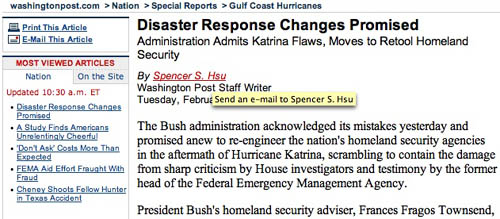In an effort to more directly engage readers, two of America’s most august daily newspapers are adding a subtle but potentially significant feature to their websites: author bylines directly linked to email forms. The Post’s links are already active, but as of this writing the Times, which is supposedly kicking off the experiment today, only links to other articles by the same reporter. They may end up implementing this in a different way.

screen grab from today’s Post
The email trial comes on the heels of two notoriously failed experiments by elite papers to pull readers into conversation: the LA Times’ precipitous closure, after an initial 24-hour flood of obscenities and vandalism, of its “wikatorials” page, which invited readers to rewrite editorials alongside the official versions; and more recently, the Washington Post’s shutting down of comments on its “post.blog” after experiencing a barrage of reader hate mail. The common thread? An aversion to floods, barrages, or any high-volume influx of unpredictable reader response. The email features, which presumably are moderated, seem to be the realistic compromise, favoring the trickle over the deluge.
In a way, though, hyperlinking bylines is a more profound development than the higher profile experiments that came before, which were more transparently about jumping aboard the wiki/blog bandwagon without bothering to think through the implications, or taking the time — as successful blogs and wikis must always do — to gradually build up an invested community of readers who will share the burden of moderating the discussion and keeping things reasonably clean. They wanted instant blog, instant wiki. But online social spaces are bottom-up enterprises: invite people into your home without any preexisting social bonds and shared values — and add to that the easy target of being a mass media goliath — and your home will inevitably get trashed as soon as word gets out.
Being able to email reporters, however, gets more at the root of the widely perceived credibility problem of newspapers, which have long strived to keep the human element safely insulated behind an objective tone of voice. It’s certainly not the first time reporters’ or columnists’ email addresses have been made available, but usually they get tucked away toward the bottom. Having the name highlighted directly beneath the headline — making the reporter an interactive feature of the article — is more genuinely innovative than any tacked-on blog because it places an expectation on the writers as well as the readers. Some reporters will likely treat it as an annoying new constraint, relying on polite auto-reply messages to maintain a buffer between themselves and the public. Others may choose to engage, and that could be interesting.
Category Archives: new_york_times
it seems to be happening before our eyes
it looks like one hundred years from now history may record that 2005 was the year that big (news) media gave way to the individual voice. the intersection of the ny times/judy miller debacle with the increasing influence of the blogosphere has made us conscious of the major change taking place — RIGHT NOW.
congressman john conyers wrote today that “I find I learn more reading Arianna, Murray Waas and Lawrence O’Donnell than the New York Times or Washington Post.”
wow!
ok — it’s judy time at if:book; but i promise only future-of-the-book related comments
these thoughts came immediately after reading the NY Times’ sad attempt to explain how the “newspaper of record” managed to lose its integrity.
1. looks to me as if the media (ny times) has become the news and the blogging community are functioning as the real journalists. can anyone reading this blog, who has been following the judith miller situation say they didn’t go to the blogosphere today to get a decent handle on how to parse what the Times just did to “cover the Judith Miller” story.
2. i want a juan cole equivalent for the judy miller story; someone who specializes in the working of behind-the-scenes washington and who knows enough about law and history to put each day’s events in perpective. at the very least i want someone to present me with the ten most useful accounts on the web so that i can triangulate the problem.
3. perhaps it would be a good thought experiment to try to come up with interesting ideas of how to organize references on the web to the judith miller situation. how would you present an overview of the references?
